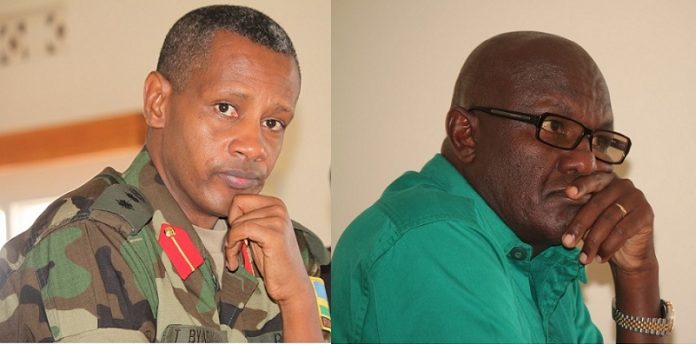By David Himbara
The show trial of my brothers Frank Rusagara and Tom Byabagamba has made me take a harder look at myself. To be sure this was a show trial. The term “show trial” dates back to what became known as “the Great Purge” or “the Great Terror” in the old Soviet Union. The Great Terror was a campaign of political repression in Soviet Union in 1936-1938 period, involving a large-scale purge of party cadres, government officials, repression of rural populations, as well as the military ranks. This was a period of widespread police surveillance, suspicion of “saboteurs,” imprisonment, and arbitrary executions. It is estimated that between 600,000 and 1.2 million innocent people were murdered by Joseph Stalin’s Soviet regime.
The trial of Rusagara and Byabagamba was no more than a show trial. The entire case was largely built on “hearsay” — which is generally considered inadmissible in most countries in the world. This trial lacked the opposite of hearsay, namely, demonstrative evidence, documentary evidence, and testimonial evidence. Revealingly, in one of testimonial evidence, a witness for the government, David Kabuye, who had earlier testified that he did not hear Frank Rusagara talk ill of the regime, changed his mind and said he had heard Rusagara say bad things. What a shame.
The reason that this show trial made think harder about me is simple — I realized that the Kagame regime has been conducting show trials. But due to my ethnic Tutsi bias, I was blind to the show trials — these show trials involved mostly members of the Hutu community. Let us look at two cases for illustration.

Take the case of Pasteur Bizimungu. Here was a former Rwandan head of state, and a symbol of reconciliation in the country, that was sentenced to 15 years in prison in show trial, later pardoned. The former head of state remains a prisoner, unwell, and not allowed to travel overseas for treatment. An ethnic Hutu from the northern Gisenyi Province — same region of President Habyarimana stronghold — Bizimungu became a member of the then rebel RPF. He was one of the group’s few Hutu members who joined the movement during its push into Rwanda from neighboring Uganda. A trained lawyer, Bizimungu was involved in negotiating the Arusha peace accords between 1992 and 1994. He was then given the role of president until 2000 when he resigned, amid growing differences with the Rwandan military strongman, Paul Kagame. Shortly afterwards, Bizimungu was put under house arrest and stripped of the privileges enjoyed by former heads of state.

Then we have the show trial of Victoire Umuhoza Ingabire. Here is a Rwandan brave who sought to run against the Rwandan strongman in the August 2010 elections. Married and a mother of three, Ingabire was an executive in the Netherlands. She resigned after deciding to dedicate herself to political leadership of homeland. Upon returning to her country after 16 years in exile, Umuhoza ended up in jail instead.
She was placed under house arrest, and later put on a show trial that charged her with terrorism, genocide ideology, and threatening national security.

The show trial of my brothers Frank and Tom just made realize that I may be the new Friedrich Gustav Emil Martin Niemöller.
Niemöller was a German pastor during the Nazi regime. He was initially a supporter of Adolf Hitler but soon realized that the dictator was no good. The pastor shortly became one of the founders of the Confessional Church, which vehemently opposed the Nazis. Martin Niemöller was to later explain his circumstance as follows:
When the Nazis came for the communists,
I remained silent;
I was not a communist.
When they locked up the social democrats,
I remained silent;
I was not a social democrat.
When they came for the trade unionists,
I did not speak out;
I was not a trade unionist.
When they came for the Jews,
I remained silent;
I wasn’t a Jew.
When they came for me,
there was no one left to speak out.

And so I here I am. In my case, I must say the following:
When they locked up Pasteur Bizimungu,
I remained silent;
I was not a Hutu.
When they came for Umuhoza Ingabire,
I did not speak out;
I was not a Hutu.
When they came for my brothers Frank and Tom,
there was no one left to speak out.
I am on my knees now — asking for forgiveness from my Hutu sisters and brothers, and for praying for my brothers Frank and Tom.





























































